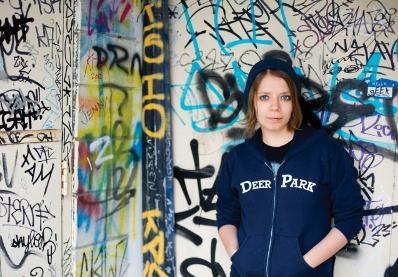Amy Campbell is homesick for the East Coast. Now living in Toronto, this Newfoundland-born chanteuse’s third album, Letters Home, pays homage to her adolescence in Halifax and is as bright as an Eastern sunrise.
Campbell says she’s been playing music for as long as she can remember, first mastering the piano as a child and then picking up guitar during her teen years. Before penning her solo debut, Architecture, in 2003, she made up one half of the duo Stumble, with Andrea Somers, performing almost exclusively in the Maritimes.
Letters Home is Campbell’s third solo effort and will drop at release parties in Halifax, on July 22, in Toronto, on July 24 and in Kingston, Aug 17.
Campbell says her folksy music definitely contains an East Coast influence, yet over the 15 years she has been performing professionally, her sound has morphed from the Lilith Fair genre to the more mellifluous music she’s penned on Letters Home.
“This record is a lot about homesickness and balance,” Campbell says. “Wanting to be true to who you are and the things you are passionate about doing. Finding yourself and feeling homesick. That emerged as a theme in this record.”
If the recording process for Letters Home had a theme, Campbell says, it would be content collaboration. Apprehensive at first, Campbell says she was ultimately grateful to producer Don Kerr, who kept her basic sound and vision intact.
Kerr has previously produced albums for Minotaurs and The Backstabbers, and Campbell says Kerr added to her album “in a way that’s sort of like seasoning what’s there, not creating a new dish. Don is incredibly collaborative and good at picking out the special quality of an artist. He has this way of going in and identifying what’s special about you, supporting it and shining a light on it.”
It was important for Campbell to include a cover of Bruce Springsteen’s “I’m On Fire” on Letters Home. After waiting for eight months, Campbell finally received confirmation from The Boss’s publishing company that he approved of her version.
“It’s a pretty standardized process. You request a licence from the publishing company. They said, ‘Okay, we’ll run it by the client.’ Then it hit me — she means Bruce Springsteen,” Campbell says with a laugh.
As for being a proud queer performer, Campbell says she’s never given the relationship between her sexuality and success in the music industry much thought. She has always used accurate pronouns in her lyrics and thinks because her music is primarily folk, fans care more about how her guitar is tuned rather than who she takes to bed.
“I think there’s a lot of pressure [in the music industry] on young women to be attractive and available. That’s not the sort of circles I move in. Maybe I’m naive and I’ve insulated myself from it. It’s always been a non-issue. I’ve always been out. My focus as a songwriter has been about trying to illustrate or illuminate emotional experiences. Sometimes I write about loss and sometimes I write about death. Being queer is a fairly large part of my identity, and there’s a lot of myself in my work. I would hope that my music is accessible to everyone.”
Everyone can agree that Campbell’s identity envelops much more than just a recording artist. Aside from a stint as a graphic designer at Xtra, Campbell has branched out to assist many philanthropic endeavours, including performing for several Babes for Breasts fundraisers and volunteering at Toronto’s Sketch, an arts studio for street-involved youth.
Campbell says she reached out to Sketch when she first moved to Toronto as a way to connect with people whose lives were vastly different from her own. Her relationship with Sketch has since evolved into a six-year engagement as an associate artist where she develops music programming and supports young artists.
“It’s a good way to keep from getting too wrapped up in my own head, my own work or losing sight of my incredible privileges in life,” Campbell says. “And as a bonus, I now know a lot of complicated hip-hop handshakes.”
Letters Home preview


 Why you can trust Xtra
Why you can trust Xtra


